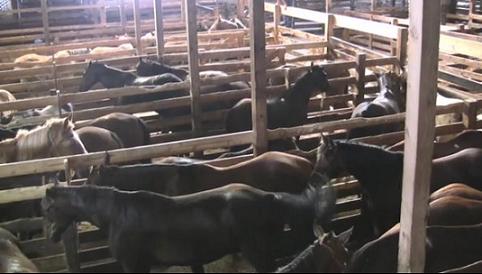Horse Slaughter Opponents Fight Back
By Paula Parisi July 5, 2013Animal protection groups are battling efforts to open horse slaughter plants, filing suit against the U.S. Department of Agriculture in federal court on grounds that the requisite National Environmental Protection Act impact reports were not conducted for proposed facilities in Illinois and New Mexico.
The Humane Society of the United States, Front Range Equine Rescue, the Marin Humane Society, the Horses for Life Foundation and Return to Freedom and five individuals are plaintiffs to the suit, filed July 2 in U.S. District Court in the Northern District of California.
The move comes as the U.S. House of Representatives renews efforts to get the Moran Amendment added back to the appropriations bill with the 2014 budget. The Moran Amendment, which defunded horse meat inspections, effectively outlawed horse slaughter plants beginning in 2007. The Moran Amendment was omitted from the 2012 fiscal budget, and no plant has yet opened in the U.S., which continues to ship horses to Mexico and Canada for slaughter.
Ongoing efforts to legislate an outright criminalize slaughter and transport to slaughter have been initiated in the house and senate, only to suffer serial death in committee before making it to vote. The controversial move to eliminate horse protection language amidst a contentious fall 2011 budget battle has energized both sides and seems to be bringing the issue to a head.
In the past two weeks, the U.S. Department of Agriculture has cleared the way for two plants to begin horse slaughter by agreeing to provide inspection services for Responsible Transportation of Sigourney, IA, and the Valley Meat Company in Roswell, NM. A third in Missouri is claiming to be “close” to getting a green-light for inspections by the USDA.
In March, Oklahoma lifted a 50-year state ban on horse slaughter.
Plant opening plans will screech to a halt if the senate signs on to the house plan. Anne Hughes, a spokeswoman for Representative Jim Moran (D-VA), said the provision has bipartisan support, and that heightened public awareness aversion to horseburgers is working in favor of anti-slaughter forces.
The slaughter issue is complicated. Proponents claim meat processing plants are a practical way to dispose of unwanted horses, while opponents say over-breeding and irresponsible ownership should not conclude in a cruel and abusive end that is unsafe for consumers, due to high levels of pharmaceutical contaminants in the average horse’s system that make them unsafe for consumption.
“The U.S.D.A. has failed to consider the basic fact that horses are not raised as a food animal,” Hilary Wood, president of Front Range Equine Rescue, said in a statement. “Horse owners provide their horses with a number of substances dangerous to human health. To blatantly ignore this fact jeopardizes human health as well as the environment surrounding a horse slaughter plant.”
The last three U.S. horse slaughter plants ─ Dallas Crown, Inc. in Kaufman, TX, Beltex Corp. in Fort Worth, TX, and Cavel International in DeKalb,IL, all had Belgian ownership. Paula Bacon, who was the mayor of Kaufman from 2003-2007, said the stench, constant flies and cries of horses being unloaded at all hours of the night were unbearable, and that kids were reluctant to play on the streets as a result of the neighborhood kill facility.
Her efforts to have the plant closed for pollution dovetailed with the Moran Amendment, which defunded USDA meat inspections for horse slaughter facilities, effectively making it illegal to process horse meat on U.S. soil. Horse slaughter is known to be toxically polluting – more so than beef, pork or poultry.
During the time that horse slaughter was dormant in the U.S., more than 100,000 horses a year were transported to slaughter plants in Canada and Mexico for shipment overseas. Horse meat is not eaten in the U.S., but is considered a delicacy in Europe, Russia and parts of Asia, as well as parts of South America. In May, the European Union passed stricter horse meat inspection regulations in the wake of a safety scandal.
Here in the U.S., on March 12, Representative Pat Meehan (R-PA) and Senator Mary Landrieu (D-LA) introduced the Safeguard American Food Exports Act of 2013 (H.R. 1094, S. 541). Known as the “SAFE Act,” it would amend the Federal Food, Drug, and Cosmetic Act to prohibit the sale or transport of equines or their parts for slaughter.
Similar bills have been initiated over the years in both the house and senate, only to die in committee. Supporters allege this has been a result of political maneuvering that guaranteed the bills would be assigned to committees controlled by rural and ranching interests determined to keep them from coming to a vote.
In January, the New Mexico plant filed suit against the USDA citing lack of action on its request for inspections to clear the way for horse slaughterhouse operations. The company also sued the Humane Society for defamation also naming Front Range Equine Rescue and Animal Protection of New Mexico as plaintiffs.
Both sides feel strongly about their positions, and the battle is far from over.
To see a Forbes.com pictorial essay of the effect of horse slaughter on the community of Kaufman, TX, click here.
To read the HSUS backgrounder on horse slaughter, click here.
Short URL: https://theequestriannews.com/?p=16339



